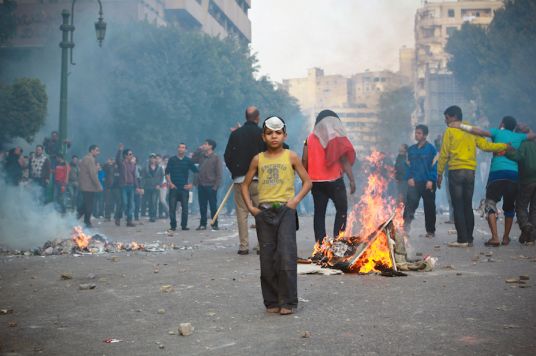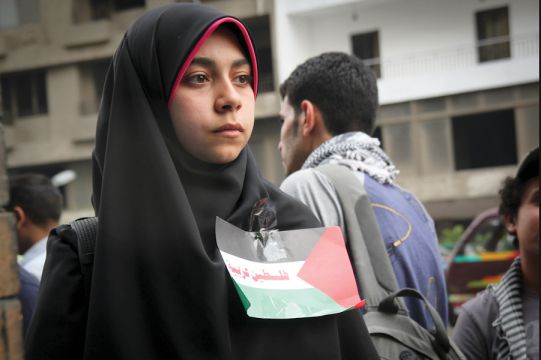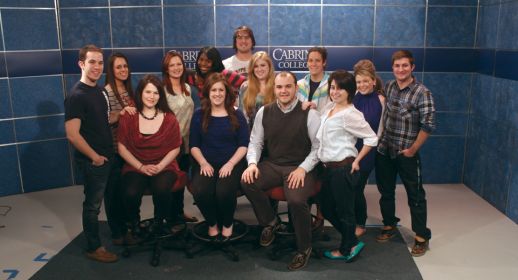When the Cabrini College Senior Honors Convergence class was offered the opportunity to make contacts with students and professors in the Middle East and North Africa through Catholic Relief Services, they were in agreement that this was a once-in-a-lifetime opportunity.
Six months later, Cathy Yungmann, associate professor of communications and the Convergence class is preparing to launch their multimedia website in April 2012. This select group of Cabrini students has established themselves as innovators; doing something that no other group of college students in the country is doing, becoming experts in the subject of “Youth in Revolt,” and striving to communicate with these youth all over the world in order to inform others about the importance of revolutions.
“Upon its completion, the Convergence project should help to educate people through individual stories, as well as cause change and allow more openness in society,” Yungmann said.
According to the project statement, “combining these first-hand accounts with background information, the students are creating a multimedia web site examining issues of social and political evolution through the lens of young adults.” They are learning about the history of social and political changes, youth empowerment and the future of the social and religious structure in these countries, among many other things.
CRS helped the Cabrini students establish the connection with Dr. Pandeli Glavanis, professor at the American University of Cairo, and his graduate students in Development Studies. Under Glavanis’ direction, his students in Cairo have been simultaneously researching the Arab Spring and the turmoil in Tahrir Square, while it is occurring right outside their classroom building. According to Yungmann, Glavanis established wikis that the Cabrini students could have access to and helped start individual conversations between the American and Egyptian students.
The connections the students have been forming have been described as “unforgettable” and “life-changing,” such as the one project manager Elizabeth Krupka has formed with an Egyptian student named Sarah. She says that she has found a life-long pen pal in Sarah, but also spoke about how difficult it has been to form other relationships with people the class has interviewed because of the dangerous situations they are in.
“When you have interviewed a girl and then you hear she is in a coma because she has been beaten up in Tahrir Square, that hits you,” Krupka said.
That is not the only type of challenge the class has faced. In fact there is a plethora of roadblocks they have had to overcome. Because the project is international, Yungmann believes the challenges this year are especially unique such as the language barrier, the threats on the students for speaking out, the seven-hour time difference forcing the Cabrini students to conduct Skype interviews at 2 a.m., setbacks with the bandwidth connections and the months dedicated to learning about the differences and intricacies in the political and religious backgrounds as well as the differences between the West and Muslim Arabs.
Yungmann also stresses the immense opportunity the students have had to advance their communication skills through the use of collaborative Google docs to share international information and interviews, Twitter to follow students and journalists, Diigo for virtual source sharing to create a virtual library, the course Wiki with ACU and Skype for the international interviews.
While the project is set to be complete in late April, those involved are looking for the benefits and outcomes to extend far into the future.
“I hope that I realize that there is something bigger than me always going on,” Krupka said. “It will ground me for the rest of my life. These people are fighting for their rights and we realized that we have these rights and we don’t even always use them.”
Her classmate, Holly Prendergast, agrees with the sentiment of valuing the fight for freedom and not taking for granted the rights we have as American citizens.
“Our project is going to be able to educate our peers and hopefully people around the world who may not be familiar with the Arab Spring and it is such an important issue because everything that they are fighting for, we have always had,” Prendergast said.
As for Yungmann who has advised these students for the past year, it’s about what they will take away as communicators and citizens of an interconnected world.
“This project brings the world down to a personal connection for these students,” Yungmann said. “Hopefully, they won’t be afraid to connect with people around the world and continue on as global citizens.”





